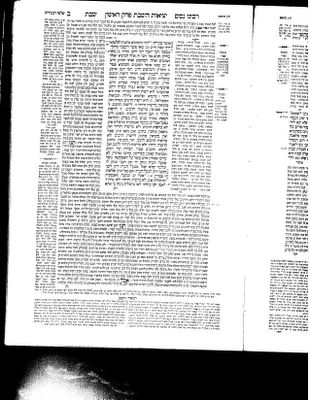
HIDE/SHOW IMAGE
2a
{Shabbat 5b}
The Sages learnt {in a brayta}: One who carries from a shop {chanut, which is a private domain} to an open space {platya, which is a public domain} via a colonnade {which is a karmelit}, he is liable. And Ben Azzai exempts {hom from liability}, for he maintains that walking is like standing in place.
{And, as Rashi explains, when he walks through the colonnade, which has the status of karmelit, and therefore he carried first from the shop, the private domain, into the karmelit, and this is a stop, and then carries from the karmelit into the open space, and for both of these things, if one transfers between a karmelit and either a public or private domain, he is exempt, as we will see shortly.}
{Shabbat 6a}
Rabbi Yochanan said: Ben Azzai admits {to the Sages that he is liable} in the case of throwing {as opposed to walking}.
A brayta also says so: If one carries [an object] from a shop to an open place through a colonnade, he is liable, whether he carries [it] out or carries [it] in; or whether he reaches it across or throws it. Ben Azzai said: If he carries it out or in, he is exempt; if he reaches it across or throws it, he is liable.
The Sages learnt {in a brayta}:
There are four domains in respect to the Sabbath; private ground, public ground, karmelith, and a place of non-liability.{Now, the brayta had said:} "But the sea, a plain, a colonnade, or a karmelith, ranks neither as public nor as private ground":
And what is private ground? A trench ten [handbreadths] deep and four wide, and likewise a wall ten [handbreadths] high and four broad, — that is absolute private ground.
And what is public ground? A highroad {Jastrow: a camp}, a great public square, and open alleys {where both ends open into streets}, — that is absolute public ground.
One may not carry out from this private to this public ground, nor carry in from this public to this private ground; and if one does carry out or in, unwitting, he is liable to a sin-offering; if deliberately, he is punished by kareth; with witnesses and warning: stoning.
But the sea, a plain, a colonnade, or a karmelith, ranks neither as public nor as private ground.
One must not carry [objects] about within it and if he does, he is not liable; and one must not carry out [an object] thence into public ground or from the public ground into it, nor carry [an object] from it into private ground or from the private ground into it; yet if he does carry out or in, he is not liable.
As to courtyards with many owners and blind alleys {in which only one side opens into a street}, if an eruv is made, they are permitted; if an eruv is not made, they are forbidden.
A man standing on a threshold {which has less than 4 X 4 handbreadths} may take [an object] from the master of the house, or give [it] to him, and may take [an object] from the poor man or give [it] to him; providing however that he does not take from the master of the house and give to the poor man or from the poor man and give it to the master of the house, and if he does take and give, the three are exempt.
{Shabbat 7a}
Are then all these [sea, plain and colonnade] too not karmelith?
When R. Dimi came {from Israel to Bavel}



No comments:
Post a Comment